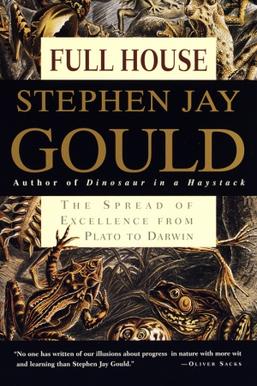One of strongest pieces of evidence that, contrary to Leibniz’s assertion, we do not live in the best of all possible worlds is that somehow Richard Dawkins is still tottering around while we lost Stephen Jay Gould to cancer in 2002.
Or maybe there’s a parallel universe version of me lamenting a Gould who lived long enough to become the villain. Who knows!
While today I try to make a point of reading as many authors as possible, my default reading position up until maybe ten years ago was to focus obsessively on single authors and suck the marrow out of them—by which I mean, read every available book, article, essay, whatever. The only hard limit I drew for myself was posthumous publications, and only because I know from firsthand experience how utterly embarrassing all of my unrevised writing is. Stephen Jay Gould was one of those obsessive focal points for me, though the volume of his writing ultimately outstripped my attention span and, thus, much of his work remains for me to read. Hooray!
I acquired Full House: The Spread of Excellence from Plato to Darwin during the period of hyperfocus, but then somehow kept on putting off reading it. I have a vague sense that I was holding off on it to save as a reward for other, more onerous reading, until that went on so long I just moved on entirely. Then, during my trip to the US, I uncovered the book in a cache I had packed up to make ready for shipping to Sweden and decided now was the time to read it and evaluate if I wanted to ship it across the ocean.
The argument Gould makes in Full House is basically one against the teleological framework of evolution: that things evolve for some higher purpose, or more specifically deliberately towards complexity; that complexity is somehow the best, most special, or most desirable form of life. Rather, Gould argues, we should look at it in terms of variety. Really what’s fantastic is that we have such a range of complexity! The basis of the book is his article “The Median is Not The Message,” originally published sometime in the early 90s, in which he points out how misleading (or not) the various statistical averages (that is, mean, median, and mode) can be. In Full House he expands his focus from cancer prognoses to batting averages and bacteria.
In a way it would probably be interesting to read this alongside Taleb’s Black Swan, which focuses on the extreme tails of the bell curve that Gould alludes to, but I don’t particularly feel like going back to re-read Taleb (I’m hoping that If Books Could Kill will one day cover Black Swan) so that essay will have to wait another day.
Full House is an interesting read, and a relaxing one. Gould had principles and politics, and much of his fame stems from publicly taking very specific stances. Here he isn’t addressing creationism or Charles Murray; the paradigm he’s looking to shift here is much more benign and so Full House is a much less stressful book. (Yes, it’s good that someone is debunking Murray, but then it’s stressful to remember that Murray is out there needing to be debunked.) But because it’s so relatively light and uncontroversial, it’s not the most essential Gould book for a personal library. Will I need to look anything up in here in order to prove a point on the Internet? Nope. Will I want to quote anything from this in order to better express my opinion on a topic? Again, probably not. The Mismeasure of Man, Rocks of Ages and The Hedgehog, the Fox and the Magister’s Pox are more the kinds of Gould books with a permanent residence in my shelves. Nonetheless a worthwhile read, and another book crossed off the to-read list.


One thought on “Full House: The Spread of Excellence from Plato to Darwin”